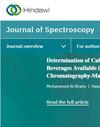基于 VIS-NIR 光谱和土壤含水量预测模型构建的特征变量选择
IF 2.1
4区 化学
Q4 BIOCHEMICAL RESEARCH METHODS
引用次数: 0
摘要
土壤水分对水文循环、地表能量平衡和水资源管理都有重大影响。由于表层土壤水分控制着蒸散和降雨渗透的物理过程,因此它是一个重要的气候变量。在这项工作中,使用可见光-近红外(VIS-NIR)波段来比较和分析不同水分浓度的黄土样本的光谱。调查研究了土壤水分含量的变化如何影响土壤光谱的响应。研究人员使用遗传算法 (GA)、区间组合优化 (ICO) 和竞争性自适应加权采样 (CARS) 从全波段光谱数据中过滤特征变量。为了预测土壤表面黄土的含水量,研究人员创建了偏最小二乘回归(PLSR)、支持向量机(SVM)和随机森林(RF)等模型。研究结果表明(1) 最可靠的频谱预处理技术是一阶导数(FD),它能显著增强模型的预测能力和频谱特征信息。(2)特征波段选择法对土壤含水量的预测效果通常优于全谱数据。(3)将遗传算法(GA)与 FD 预处理光谱相结合,建立了准确度最高的土壤含水率随机森林(RF)预测模型。这些结果可为如何利用 VIS-NIR 测量土壤含水量提供新的认识。本文章由计算机程序翻译,如有差异,请以英文原文为准。
Feature Variable Selection Based on VIS-NIR Spectra and Soil Moisture Content Prediction Model Construction
The hydrological cycle, surface energy balance, and the management of water resources are all significantly impacted by soil moisture. Because it governs the physical processes of evapotranspiration and rainfall penetration, surface soil moisture is a significant climatic variable. In this work, visible-near infrared (VIS-NIR) bands were used to compare and analyze the spectra of loess samples with varying moisture concentrations. The investigation looked at how changes in the soil moisture content impacted the response of the soil spectra. The researchers used a genetic algorithm (GA), interval combination optimization (ICO), and competitive adaptive reweighted sampling (CARS) to filter feature variables from full-band spectral data. To forecast the moisture content of loess on the soil surface, models like partial least squares regression (PLSR), support vector machine (SVM), and random forest (RF) were created. The findings indicate that: (1) the most reliable spectrum preprocessing technique is the first derivative (FD), which can significantly enhance the model’s prediction power and spectral characteristic information. (2) The feature band selection method’s prediction effect of soil moisture content is typically superior to that of full-spectrum data. (3) The random forest (RF) prediction model for soil moisture content with the highest accuracy was built by combining the genetic algorithm (GA) with the FD preprocessed spectra. The results may provide a new understanding on how to use VIS-NIR to measure soil moisture content.
求助全文
通过发布文献求助,成功后即可免费获取论文全文。
去求助
来源期刊

Journal of Spectroscopy
BIOCHEMICAL RESEARCH METHODS-SPECTROSCOPY
CiteScore
3.00
自引率
0.00%
发文量
37
审稿时长
15 weeks
期刊介绍:
Journal of Spectroscopy (formerly titled Spectroscopy: An International Journal) is a peer-reviewed, open access journal that publishes original research articles as well as review articles in all areas of spectroscopy.
 求助内容:
求助内容: 应助结果提醒方式:
应助结果提醒方式:


